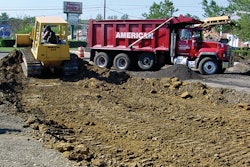By Deborah Wilder
Lady, I have been doing public works for 35 years. There isn't anything that I don't already know about prevailing wages."
Unfortunately, that is the first sign of a contractor in trouble on a public works project. The requirements of prevailing wages on public works projects have gotten far more complicated than 35 years ago. Whether you perform public works in just one county or work across state lines, it would behoove you to have someone take another look at the latest in prevailing wage requirements in your jurisdiction.
Davis-Bacon:
Davis-Bacon wages are generally established every one to three years over large geographic, regional areas. The determination defines a prevailing wage which includes a wage rate and a fringe package. The rates are generally published in the bid specifications and are good for the life of the project.
State Prevailing Wages:
With legislatures changing prevailing wage law requirements every year or so, here are some questions any good contractor should ask about the prevailing wage requirements in your area:
How and when are the prevailing wages set? In some states, they are published on a state website and are valid for a period of six months. In other states, prevailing wages are set by a committee on a project-by-project basis.
Are there any increases to prevailing wages that will apply to the project? Some prevailing wages are set for the entire life of the project, whether the project is two months or two years. Other jurisdictions set required increases at various intervals on the projects.
Are there special overtime rules or rates for weekend or holiday pay? Some jurisdictions require overtime on prevailing wage projects for work after eight hours in a day, some only for 40 hours a week. Some jurisdictions require premium pay for weekends or holiday work, others do not.
Are there special rules relating to scope of work, and what happens if more than one trade claims the work?
Are there special contributions that must be made on prevailing wage projects which cannot go on the employee's paycheck? In California, training contributions must be paid to either an approved apprenticeship committee or to the State Apprenticeship Council, not to the employee.
Are there special rules relating to the hiring of apprentices? Almost all jurisdictions require you only hire apprentices who are enrolled in a Bureau of Apprenticeship Training approved apprenticeship program in order to pay the lower apprenticeship rates. Some jurisdictions also mandate the use of, or at the least the "good faith effort" request of, apprentices on every public works project.
Are there any other special paperwork requirements? Most jurisdictions require certified payrolls and some type of fringe benefit statement listing the benefits paid. Other jurisdictions require special project registration forms or required apprenticeship forms.
Who is your "go to person" for prevailing wage update? Whether it is an attorney or industry veteran, put in a call to your local expert to make sure that last year's rules and regulations have not changed.
With many jurisdictions requiring the imposition of penalties from $10-$50 per worker per day and potential debarment from public works projects for errors, public works has become a complicated arena for contractors. Having access to good resources and up-to-date information will save a contractor time and money.
Deborah Wilder is an attorney and president of Contractor Compliance and Monitoring, Inc. She is also the president of Women Construction Owners and Executives, USA; [email protected].
















